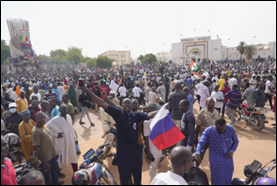Academy SITREP – U.S. Orders Partial Evacuation of Embassy in Niger
August 4, 2023

What has Happened: Last week, Niger’s President Mohamed Bazoum was ousted from power in a coup by the military led by General Abdourahmane Tchiani. As a result, the U.S. and France threatened to cut ties with Niger (halting hundreds of millions of dollars in aid), France sent home its citizens from the country, and the U.S. began an evacuation of non-emergency government personnel. The Economic Community of West African States (ECOWAS) issued a seven-day ultimatum to the coup leaders to restore the ousted president to office or face consequences including possible military action. In response to this, neighboring Sahel region ... Academy SITREP – U.S. Orders Partial Evacuation of Embassy in Niger


